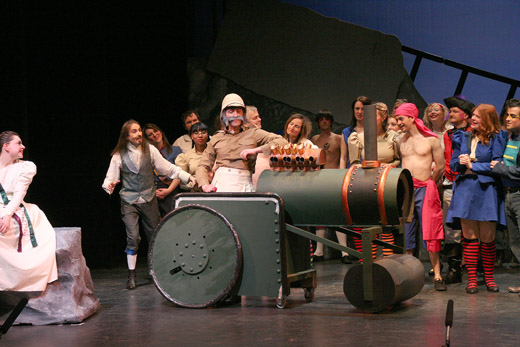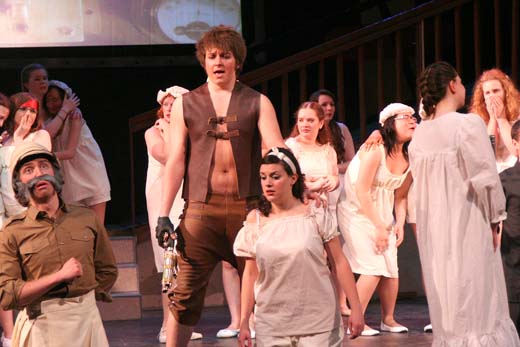Other Links
Editorial Board
-
Editor - Bill Kenny
Assistant Webmaster - Stan Metzger - Founder - Len Mullenger
Google Site Search
SEEN AND HEARD UK OPERA REVIEW
W S Gilbert and Arthur Sullivan, The Pirates of Penzance:
Manchester University Gilbert & Sullivan Society (MUGSS) Michael Betteridge (conductor) Royal Northern College of Music, Manchester, 5.5.2010 (RJW)
Cast:
Frederic - William Lindsay
Pirate King - Nick Bennett
Samuel - Andy Owens
Sergeant of Police - Matt Holker
Ruth - Zoe Wilkinson
Mabel - Eleanor Hibberd
Edith - Alice Needham
Kate - Jo Plant
Directed by Ian Field and Grahame Jebb

Major General Stanley’s arrival
The first night audience were given a treat with this polished performance of the fourth comic opera written by Gilbert and Sullivan. This merry band of G & S student enthusiasts has been going strong for 60 years and they have always delighted their audiences with novel interpretations of the Savoy operas. First performing in a cramped Reynold’s theatre then an equally cramped Dance Studio, they have now made the spacious and well-equipped Opera theatre of the RNCM their home.
This year their competence was outstanding. All soloists are strong singers providing excellent diction and radiating warmth, enthusiasm and energy. The divergent thinking behind their productions have always resulted in novel interpretations with regard to staging: the music is always played straight by gifted student musicians and does full justice to Sullivan’s elegant scores. For the second year running, the musical direction has been under the able and competent direction of Michael Betteridge and we have now seen the results of his efforts. An outstanding and well-drilled chorus provided electrifying “Hail Poetry” and “To Queen Victoria” choruses, as good as any D’Oyly Carte/Carl Rosa singing that I’ve heard.
This University company is made up of students past and present who feel they have a thespian calling in addition to their professional courses; and what good voices they have. Caribbean pirates, bum-bustling uniformed girls, robotic police and a Major General Stanley, reminiscent of Major Bloodnok (of BBC Goons fame) with tropical ‘dress’ (in full senses of the word!) and a panama have given us something different. Ed Owen’s patter song and ‘orphan/often’ exchanges were well thought out and acted along with Nick Bennett and Andy Owens.
A youthfully innocent Frederic (William Lindsay), an excellent tenor, carried much of the momentum of the show with his charisma, stage action and emotional involvement. Partnered by Mabel (Eleanor Hibberd), who soared effortlessly with her Italianate coloratura in ‘Poor Wandering One’, they provided a strong presence. Both voices punched through the finales admirably. Ruth (Zoe Wilkinson) deserved applause after her good singing and clear explanation of the Pilot/Pirate mix-up in ‘When Frederic was a little lad’, but I suspect the intrusive pauses and change of pace broke up the number too much to induce spontaneous applause.

Samuel, The Major General and distraught girls
I had not previously been aware of the extent of Samuel’s role in Gilbert’s book until tonight’s interpretation by Andy Owens who like Frederic, with equally cheerful charisma, made something memorable of the part. Alongside another excellent voice, the Pirate King, his duet ‘Orphan boy’ harmonised superbly.
The police with laser batons was led by a robotic sergeant who was ingeniously ‘engineered’ with LED captions and is nothing that could have been dreamt up by Dr. Who, never mind Gilbert. A digitally screened ‘Keynotes style’ presentation (PowerPoint being old hat) carried some of the police lyrics and provided clever well-designed visuals to accompany the ‘Paradox’ recit. Mention of “the astonomer royal” brought a laugh when an appropriate mug shot of Sir Patrick Moore [The venerable presenter of BBC TV’s Sky at Night programme for many years. Ed] was screened. For me, the police were a slight weakness: these basses though strong in Act I, did not provide the robust fanfared “tarantara” in Act II that I was expecting. Neither though were they deliberately dolce camp. A few pianissimo sections added effectiveness, but their accompaniment could have also been pp to help carry their singing further than the first few rows. I liked the introduction of a few musical pauses followed by ‘a tempo’ sections within some numbers since this effectively accentuates the plot, but the stop/start effect was used rather too often and musically made some brisk numbers ploddish: the Pirate King’s song quickly loses its melody (and momentum) unless the whole number is briskly taken as one.
An excellent property department provided laser guns, a net from solenoid airships to ensnare the daughters, and radio-controlled electronic gadgetry much better presented than those naff presenters of Channel 5 televisions Gadget Show. Of particular mention should be the creation of costumes from scratch by hard-working Rian Bootle and Ashley Carver since they added good variety and colour.
Ian Field and Grahame Jebb’s production was very effective and displayed an excellent sense of stagecraft. The chorus groupings and stage movement used the full stage and prevented any static monotony creeping in: there was always something to watch. The characterisations were both effective and realistic and the company was particularly well-rehearsed for this first night: the result was highly professional. Scenery can be a weakness because a large proscenium is too big to fill on a shoestring budget, but here the conglomerate really looked stoney and we had a clever Samoiloff lighting effect of changing a complete sky vista into sky and sea, and back again. In fact, Sam Stutter’s lighting throughout was sensitively handled, using subtle mood changes rather than the hard incongruous changes that have marred some previous productions. Here it complemented the action, and colour was used unobtrusively.
Act I worked well yet a ‘Back to the Future Part VI’ concept for Act II, although inventive, did not complement either the dialogue or plot. One finds it difficult to relate the surroundings of Van der Graaff columns with “..you bought this chapel, a draughty ruin.. and the stucco hardly dry”. The mind is lost and something more cobwebby with gobos might have been effective with less effort.
Always looking for something with which to wake up the audience, the 1879 original version of the Act II finale (with additional recit and “To Queen Victoria’s name we bow”) was used to good effect. The energy shown in this production was very much appreciated.
Raymond J Walker
